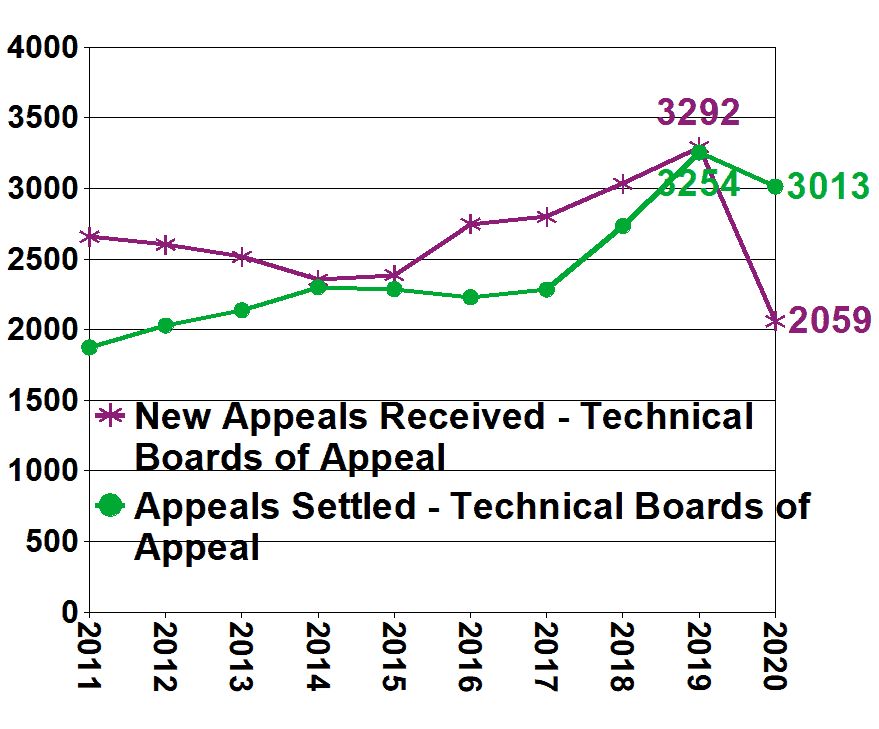 Clearly, 2020 was a year in which the COVID-19 pandemic presented the Boards of Appeal and the wider EPO with significant challenges.
Clearly, 2020 was a year in which the COVID-19 pandemic presented the Boards of Appeal and the wider EPO with significant challenges.
According to the Annual Report of the Boards of Appeal, in 2020 the Technical Boards of Appeal received 37% (1233) fewer new appeals than in 2019. Rather than applicants, patentees and opponents having less appetite for appeals in 2020 this was evidently the result of EPO first instances generating fewer appealable decisions.
In contrast, in 2020, only 7% (241) fewer appeals to the Technical Boards of Appeal were settled than in 2019. At first sight it might seem from this that the ability of the Technical Boards of Appeal to settle appeals was relatively unaffected in 2020. However, in 2020 only 920 oral proceedings took place compared to 1560 in 2019, which indicates that the capacity of the Boards was significantly affected.
Appeals to the Technical Boards of Appeal of course fall into two categories: ex parte (examination) appeals and inter partes (opposition) appeals. Inter partes (opposition) appeals suffered most in 2020. The number of inter partes (opposition) appeals received in 2020 fell by 43% (835) compared to 2019. 12% (221) fewer inter partes (opposition) appeals were settled in 2020. In comparison, the number of ex parte (examination) appeals received in 2020 fell by 30% (398) compared to 2019. Only 1.5% (20) fewer ex parte (examination) appeals were settled in 2020.
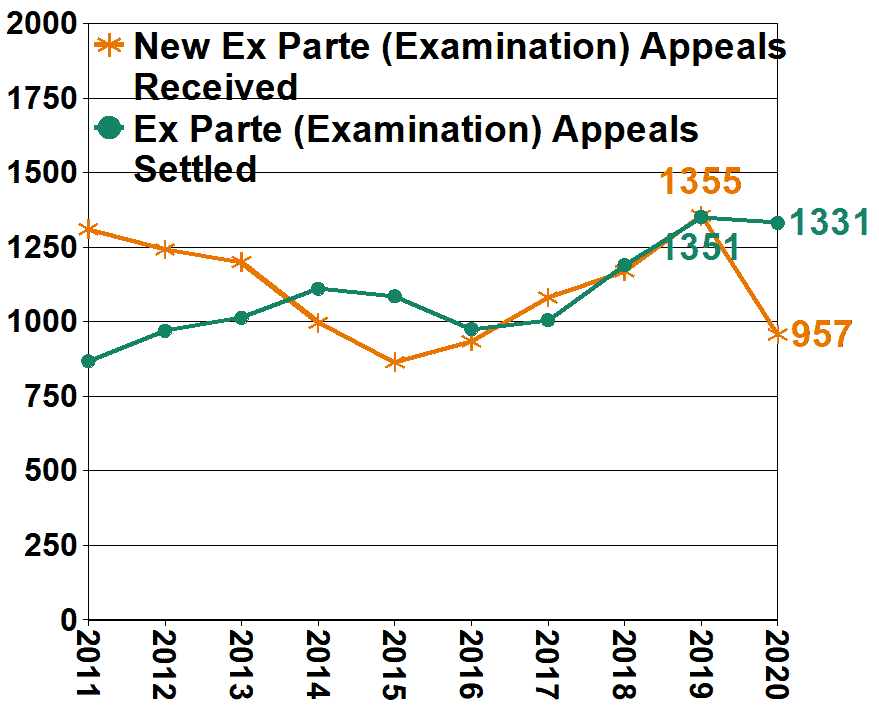
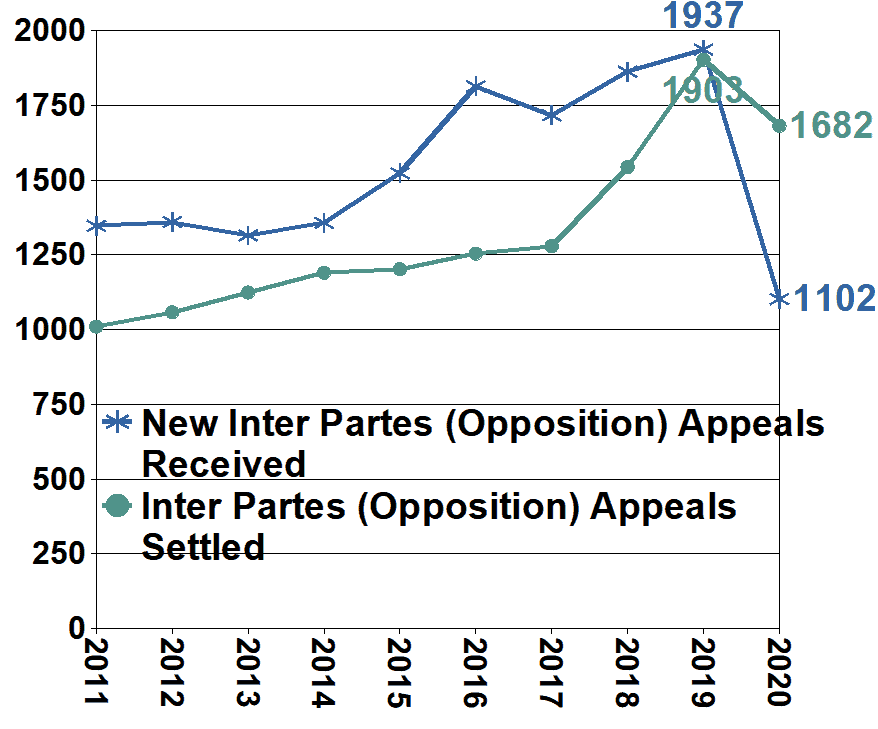
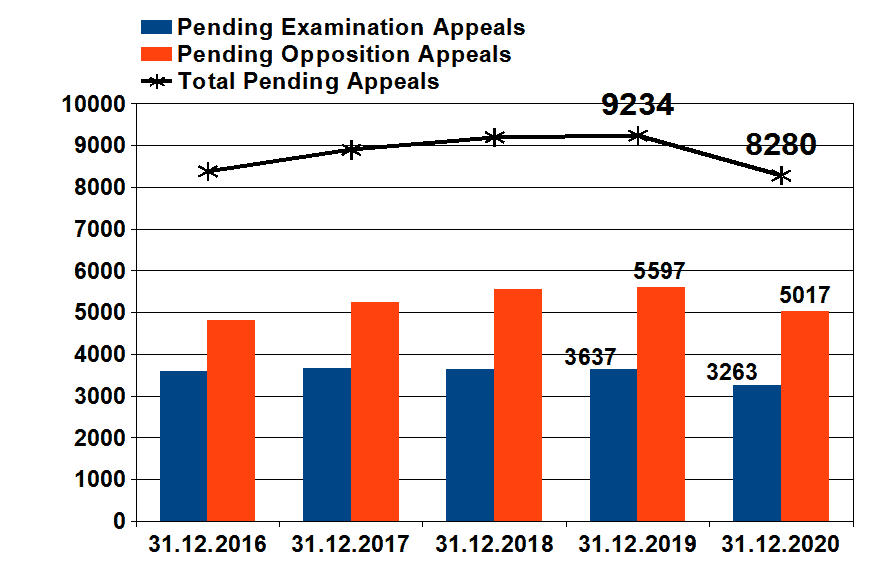
The fall in new appeals, with the lesser fall in appeals settled, resulted in a 10% reduction in appeals pending at the end of 2020, both for ex parte (examination) appeals and inter partes (opposition) appeals.
Ex parte (examination) appeals handled by the Technical Boards of Appeal arise from decisions of first instance Examining Divisions and for the most part concern first instance refusals of applications based on substantive examination of the merits of the applications concerned. On occasion, appeals handled by the Technical Boards of Appeal may relate to other matters arising in first instance examination by Examining Divisions (e.g. first instance refusals of requests for re-establishment of rights; failures to meet formal requirements) but such appeals appear to be rare.
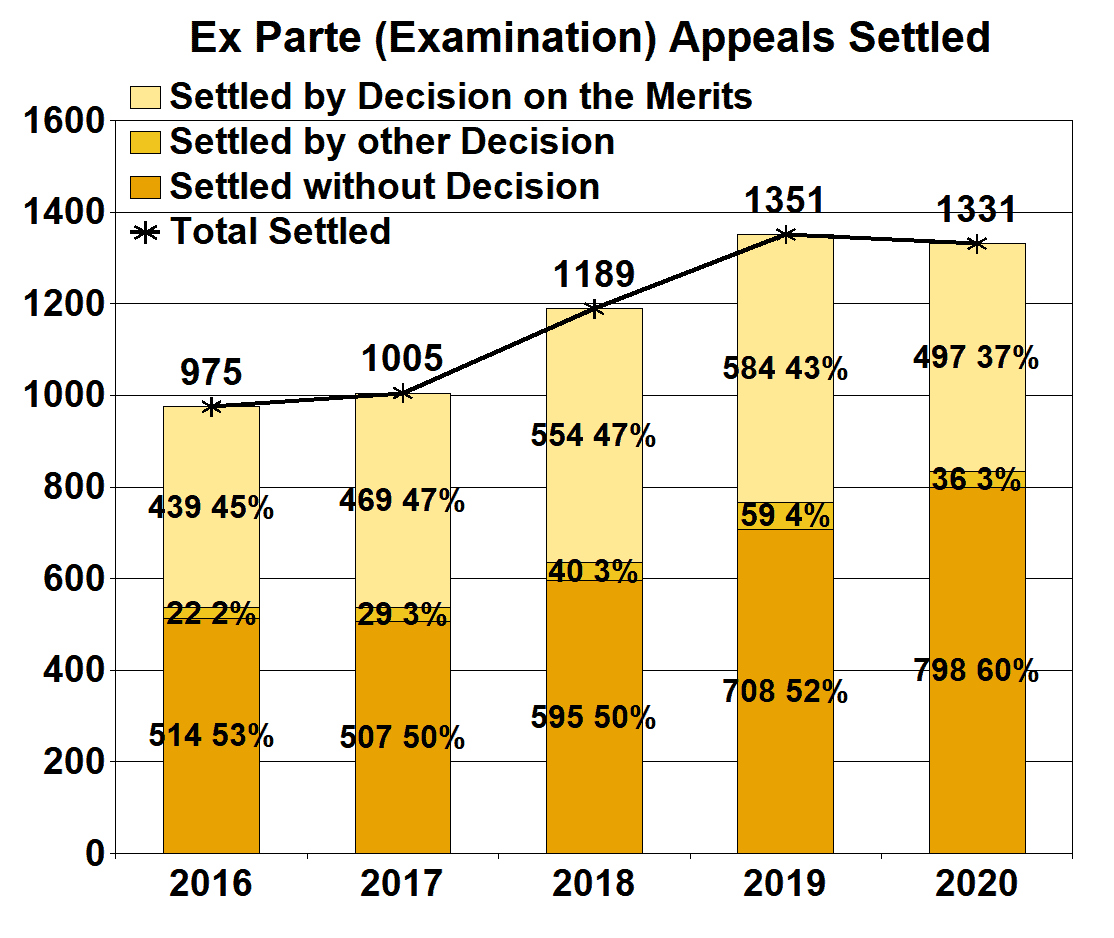
Ex parte (examination) appeals may be settled by decisions of the Technical Boards of Appeal or without decisions of the Boards.
Ex parte appeals settled without decisions have typically been withdrawn by the appellants (though there might be unusual circumstances, such as “appeal deemed not filed”, which could also qualify as “settled without decision”).
In 2020 the number of ex parte (examination) appeals settled without decisions increased, in the context of a largely unchanged total number of appeals settled. In particular the number of appeals which were withdrawn after issue of substantive communications by Boards of Appeal increased markedly (timely withdrawals after issue of substantive communications providing the possibility of refunds of part of the appeal fee). It appears that in 2020 there was an increase in the number of substantive communications issued by Boards of Appeal, which might be expected to have resulted in increased withdrawals.
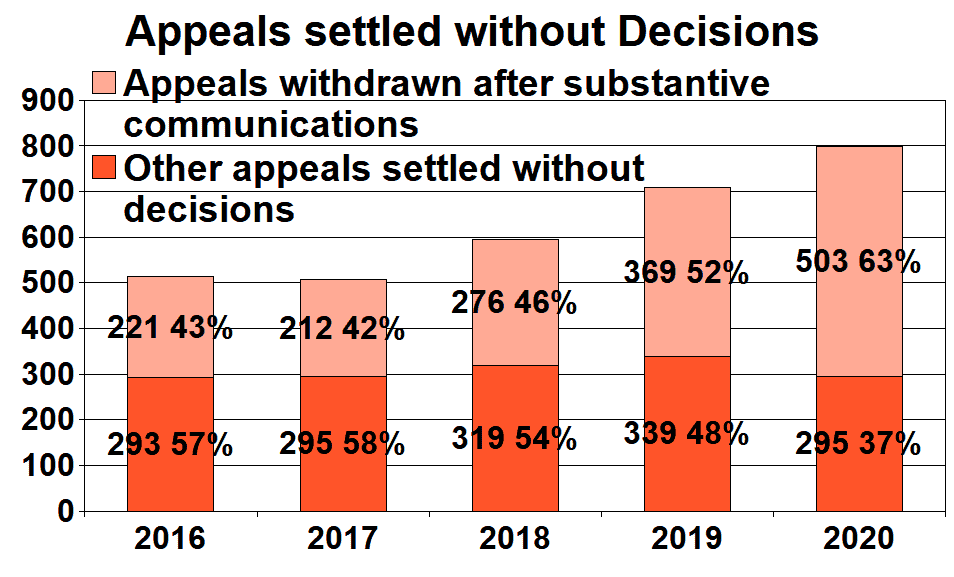
A small fraction (ca. 3%) of ex parte (examination) appeals have been settled by decisions of the Technical Boards of Appeal based not on the merits of the appeals but on more or less formal matters (e.g. identification as appellant of a party not entitled to appeal; payment of a reduced fee for appeal when not entitled to reduction, etc.).
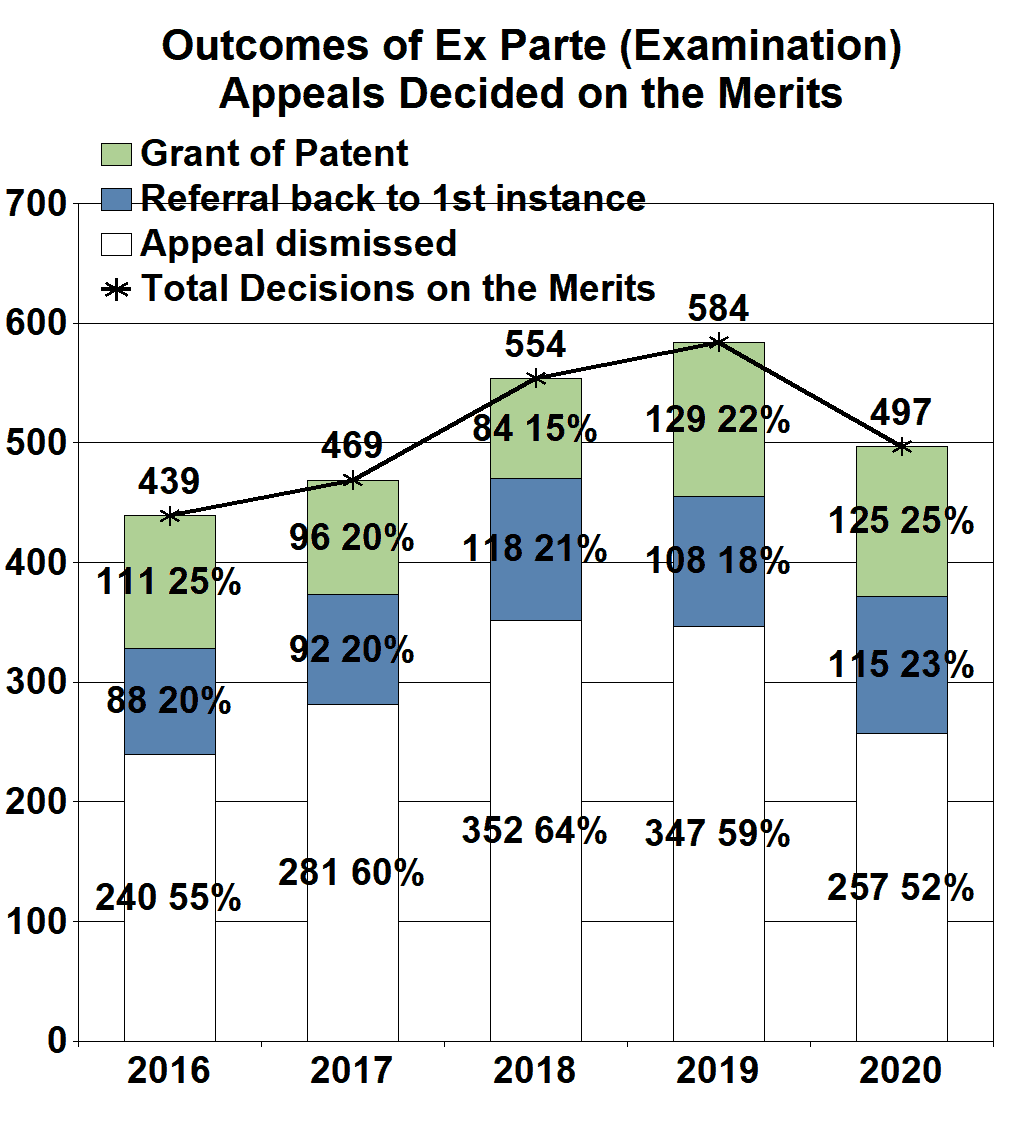 Ex parte (examination) appeals settled by decisions based on the merits have most often had the outcome “appeal dismissed”: the appeal fails and the first instance decision stands unrevised. However, there was a considerable fall in the number and proportion of appeals dismissed in 2020, perhaps related to the increase in appeals withdrawn after substantive communications from the Boards. Around one fifth of decisions on the merits have been for referral back to the first instance: objections which brought about the appeals are overcome but other issues remain to be addressed and require “two-instance” consideration. Up to a quarter of decisions have been to grant patents – in one form or another, which may not be the form initially sought in the first instance proceedings.
Ex parte (examination) appeals settled by decisions based on the merits have most often had the outcome “appeal dismissed”: the appeal fails and the first instance decision stands unrevised. However, there was a considerable fall in the number and proportion of appeals dismissed in 2020, perhaps related to the increase in appeals withdrawn after substantive communications from the Boards. Around one fifth of decisions on the merits have been for referral back to the first instance: objections which brought about the appeals are overcome but other issues remain to be addressed and require “two-instance” consideration. Up to a quarter of decisions have been to grant patents – in one form or another, which may not be the form initially sought in the first instance proceedings.
Inter partes (opposition) appeals handled by the Technical Boards of Appeal arise from decisions of first instance Opposition Divisions and for the most part concern first instance findings based on substantive examination of the merits of the oppositions concerned. On occasion, appeals may relate to other matters arising in first instance opposition proceedings (e.g. identity of opponents, transfer of oppositions) but such matters appear to be relatively rare.
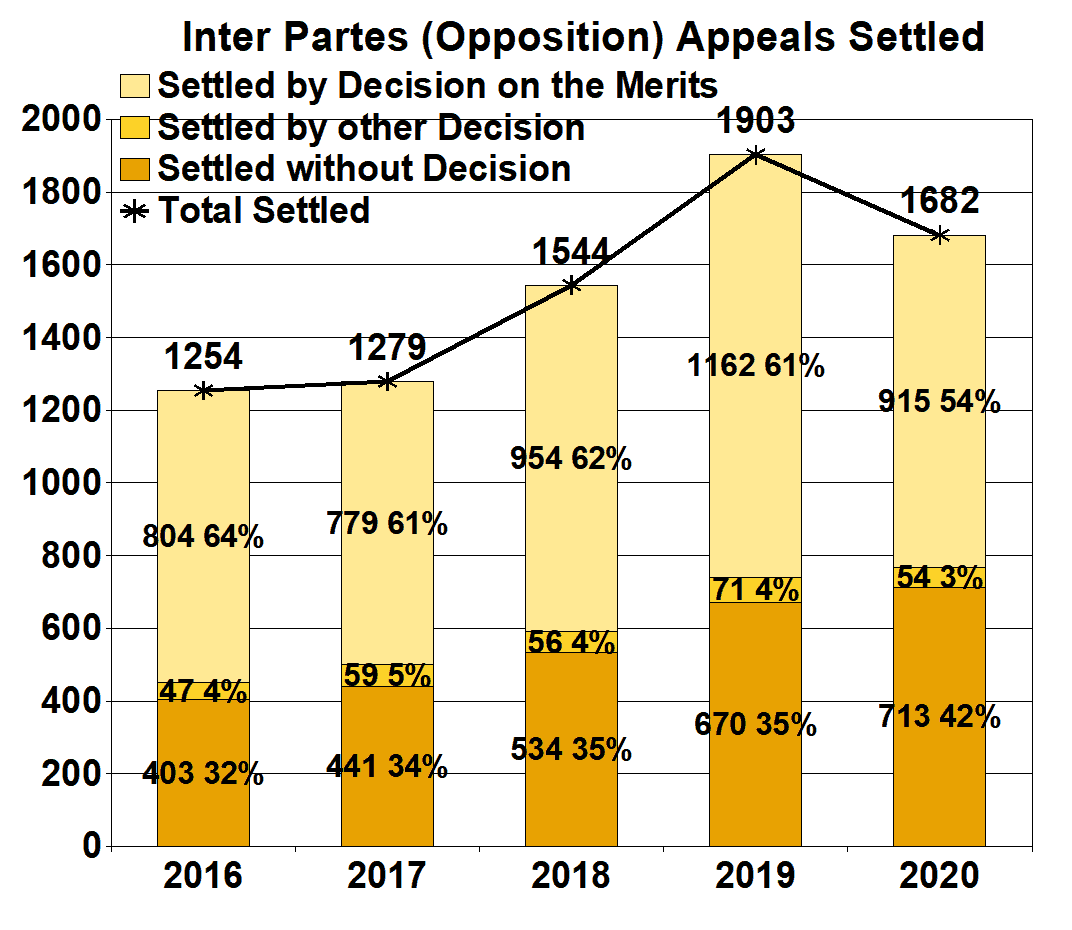
Inter partes (opposition) appeals may be settled by decisions of the Technical Boards of Appeal or without decisions of the Boards.
In general only about one third of inter partes (opposition) appeals have been settled without decisions. However, the number of appeals settled in this way increased in 2020 in the context of an overall fall in the total number of inter partes (opposition) appeals settled.
Of inter partes (opposition) appeals settled without decisions the proportion of appeals withdrawn after substantive communications from the Boards of Appeal has been increasing, and increased particularly strongly in 2020. As noted above, it appears that in 2020 there was an increase in the number of substantive communications issued by Boards of Appeal, which might be expected to have resulted in increased withdrawals.
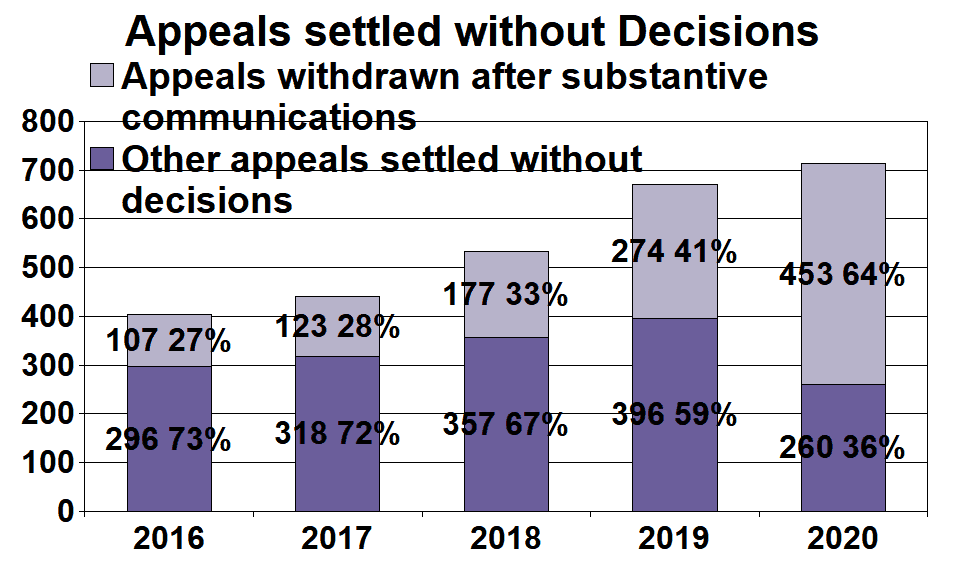
A small fraction (ca. 4%) of inter partes (opposition) appeals have been settled by decisions based not on the merits of the appeals but on more or less formal matters (e.g. identity of opponent-appellants).
A majority of inter partes (opposition) appeals have been settled by decisions on the merits, though the number of those decisions fell in 2020.
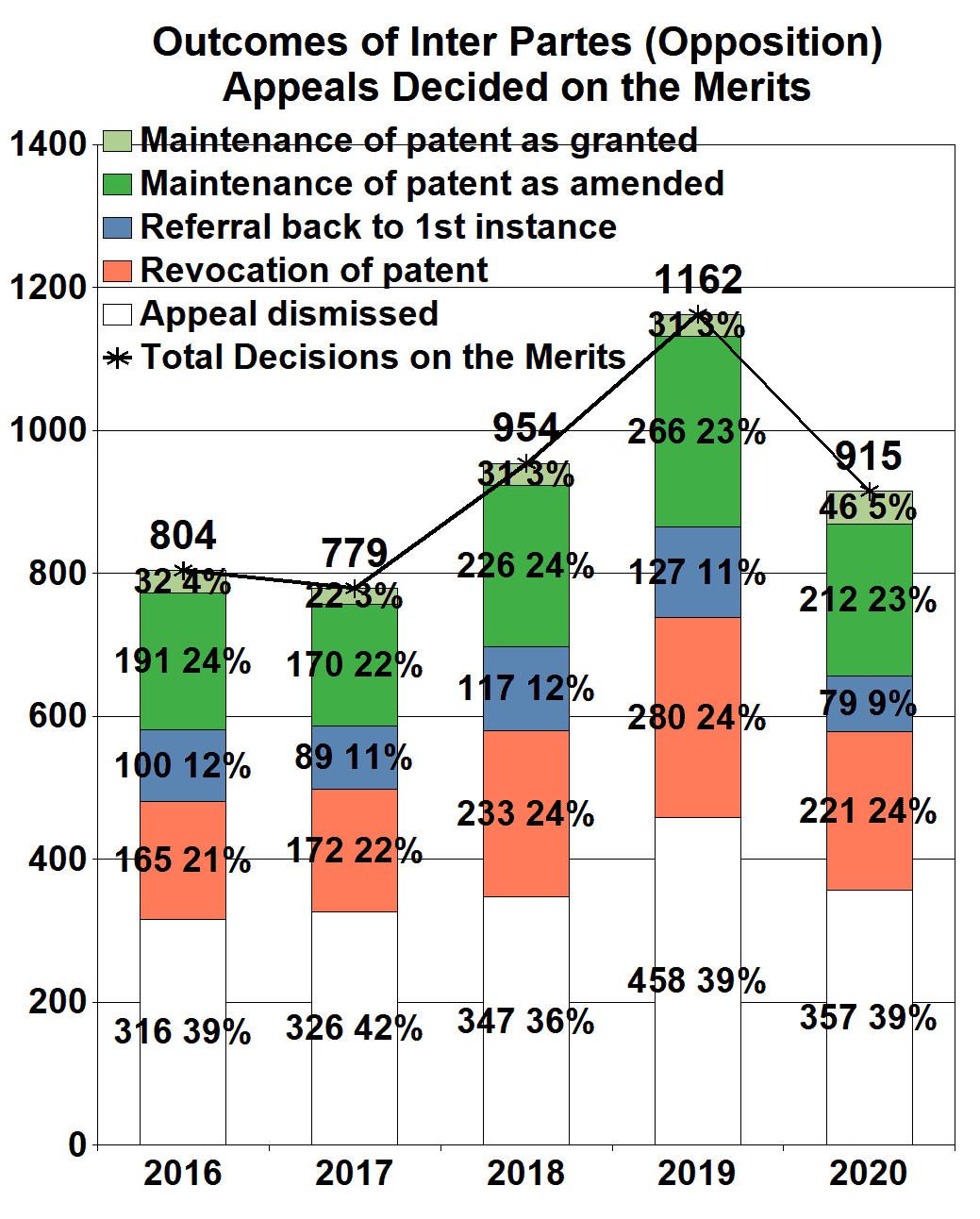
The single most likely outcome has been dismissal of the appeals: first instance decisions stand unrevised. However, in appeals settled on the merits first instance outcomes have most often been revised in some way, with the revised outcomes ranging from revocation of patents to maintenance of patents as granted, but also including less extreme revisions such as maintenance of patents in some newly amended form and outcomes in which the cases are referred back to the first instance (objections which brought about the appeals are overcome but other issues remain to be addressed and require “two-instance” consideration). Any revision could be seen as at least partial success of the appeals for the appellants, or one of the appellant parties in cases in which patentees and opponents both appeal.
Amended Rules 2020
Rule 103 EPC was amended on 1 April 2020 to provide more scope for refunds of some of the appeal fee, apparently encouraging appellants to consider at each stage whether they have a continuing interest in pursuing their appeals.
Rule 103 EPC now provides for Boards of Appeal to issue communications indicating their intention to commence substantive examination of appeals. If an appeal is then withdrawn within two months of notification of such a communication the appellant receives a 75% refund of the appeal fee. 560 such communications were issued in 2020 and 30 refunds of 75% obtained.
Rule 103 EPC also provides for a 50% refund if appeals are withdrawn within specified time limits after the Boards of Appeal have issued substantive communications on the cases concerned. Such withdrawals of inter partes (opposition) appeals increased by 65% from 2019 to 2020 and withdrawals of ex parte (examination) appeals increased by 36%.

It may be worth noting that, with many oral proceedings postponed, the Boards were able to redirect resources and issue a significantly greater number of substantive communications in 2020.
A further new provision of Rule 103 EPC allows for a 25% refund of the appeal fee even if the appeal is withdrawn at a very late stage, provided that it is withdrawn before the appeal decision is announced at oral proceedings or, alternatively, issued in writing. Beyond that another new provision, which does not require withdrawal of the appeal, allows for a 25% refund if any request for oral proceedings is withdrawn within one month of notification of the communication issued by the Board of Appeal in preparation for the oral proceedings, and no oral proceedings take place. In 2020 the 25% refund was applied in 380 cases. In 28 of those cases a decision was issued but no oral proceedings took place due to the withdrawal of the request for oral proceedings.
This is for general information only and does not constitute legal advice. Should you require advice on this or any other topic then please contact hlk@hlk-ip.com or your usual Haseltine Lake Kempner advisor.